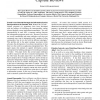Free Online Productivity Tools
i2Speak
i2Symbol
i2OCR
iTex2Img
iWeb2Print
iWeb2Shot
i2Type
iPdf2Split
iPdf2Merge
i2Bopomofo
i2Arabic
i2Style
i2Image
i2PDF
iLatex2Rtf
Sci2ools
112
click to vote
CJ
2006
2006
Atomic Hypermedia
s the development of an abstract description of what there is in the world in an application-independent form. This paper argues that attempts to support information systems interoperation by building catalogues of everything are doomed to failure. The paper shows that several upper ontologies would be expected to fail due to semantic heterogeneity. On the other hand, the paper argues that it is possible to follow Kant's proposal in his `Critique of Reason' and to develop an application-independent subclass of upper ontology which can succeed in the face of semantic heterogeneity. Kant looked to the form of knowledge rather than to content. This paper follows Kant to find plausible constituents of a formal ontology which is independent of material content and which specifies not what there is in the world but how what there is can appear to information systems. In this way, a formal ontology can be used to construct a particular material ontology. Atomic Hypermedia. Duncan Ma...
Related Content
| Added | 11 Dec 2010 |
| Updated | 11 Dec 2010 |
| Type | Journal |
| Year | 2006 |
| Where | CJ |
| Authors | Duncan Martin, Helen Ashman |
Comments (0)

